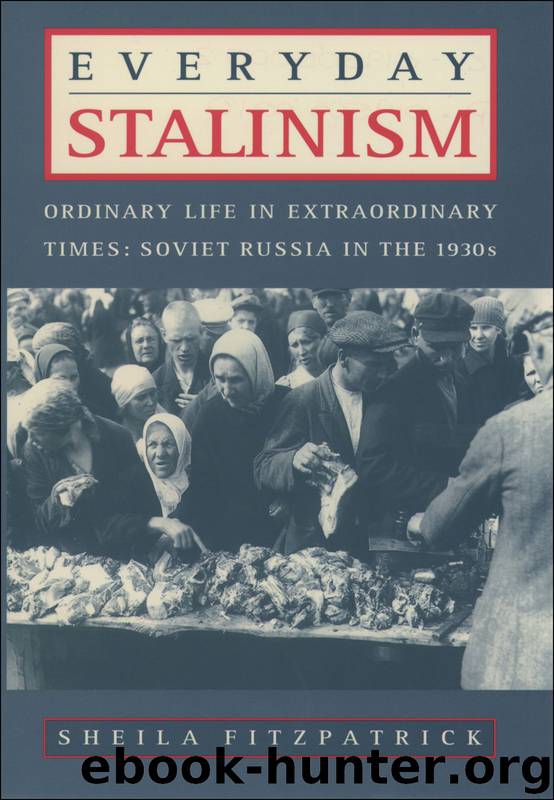Everyday Stalinism by Fitzpatrick Sheila;

Author:Fitzpatrick, Sheila;
Language: eng
Format: epub
Publisher: Oxford University Press
Published: 1999-04-12T04:00:00+00:00
Neglected Children
The upbringing of children is normally considered women’s business, and so it was in Soviet Russia in the 1930s. It was women, not men, who wrote again and again to the authorities asking for help for their children, “barefoot and hungry.” It was women too who occasionally despaired and wrote to the authorities begging them to have their children taken into state care or adopted as mascots by army regiments. It was a woman who, on hearing her younger children cry for bread after two weeks of hunger in the winter of 1936–37, “got up and went into the kitchen and ended her life”; and it was even a woman, a widowed kolkhoz chairman with two young children, who cabled the regional party secretary that if bread was not sent “she would be obliged to abandon the children to the kolkhoz and run away.”29
If women were the main providers of child care, it would seem to follow that they would also be the ones held primarily responsible for child neglect. Sometimes this was the case, although it was more common (at least in the press) to find stepmothers charged with cruelty and neglect than natural mothers. But there were other cases where men incurred more blame than women, even when both were apparently responsible. Child neglect was a major problem of urban Russia in the 1930s, linked with casual marriage and divorce, women working, and above all the housing problem.
Housing was the key factor in one of the more vexing case of child neglect and abuse encountered by party leaders and judicial authorities. Rosa Vasileva was a fourteen-year-old Moscow schoolgirl in 1936 when she wrote an earnest letter to Stalin suggesting a “child tax,” to be paid by all Soviet citizens, from which the state would pay each child a stipend from birth to age eighteen. This was to protect children from possible neglect and abuse by their parents. Although Rosa’s letter was couched in abstract terms and contained no direct personal appeal, she did indicate that she had firsthand knowledge of problems associated with divorced parents and contested living space. Perhaps this was what caught the eye of Stalin’s assistant, Poskrebyshev, and prompted him to forward the letter to Andrei Vyshinsky, a legal expert who was deputy head of the Council of People’s Commissars.
Vyshinsky had the Moscow city prosecutor’s office investigate Rosa’s situation, and a sad story emerged. Like so many sad Soviet stories, it revolved around housing. Rosa and her parents had once lived together in a room of 11 square meters. Then her parents got divorced, and Rosa stayed on in the room with her father, Aleksandr Vasilev. When his job took him outside Moscow, he found a woman, Vronskaia, to look after Rosa on a live-in basis. But the militia would not register Vronskaia as a separate occupant because the room was too small, so (as he later explained) he was forced to marry her to get her registered. The Prosecutor’s Office put almost all
Download
This site does not store any files on its server. We only index and link to content provided by other sites. Please contact the content providers to delete copyright contents if any and email us, we'll remove relevant links or contents immediately.
| Africa | Americas |
| Arctic & Antarctica | Asia |
| Australia & Oceania | Europe |
| Middle East | Russia |
| United States | World |
| Ancient Civilizations | Military |
| Historical Study & Educational Resources |
Red Famine: Stalin's War on Ukraine by Anne Applebaum(2816)
Chernobyl by Serhii Plokhy(2440)
Midnight in Chernobyl by Adam Higginbotham(2391)
The House of Government by Slezkine Yuri(2105)
Midnight in Chernobyl: The Untold Story of the World's Greatest Nuclear Disaster by Adam Higginbotham(2079)
Red Shambhala by Andrei Znamenski(2073)
The Gulag Archipelago (Vintage Classics) by Aleksandr Solzhenitsyn(1987)
All the Kremlin's Men by Mikhail Zygar(1962)
From Cold War to Hot Peace by Michael McFaul(1941)
Red Notice by Bill Browder(1933)
Putin's Labyrinth(1902)
The Future Is History by Masha Gessen(1822)
From Russia with Lunch by David Smiedt(1797)
A People's Tragedy by Orlando Figes(1769)
The Romanovs by Simon Sebag Montefiore(1723)
How to Tame a Fox (and Build a Dog): Visionary Scientists and a Siberian Tale of Jump-Started Evolution by Lee Alan Dugatkin & Lyudmila Trut(1680)
Putin's Labyrinth: Spies, Murder, and the Dark Heart of the New Russia(1664)
The Lost Spy by Andrew Meier(1634)
Art and Revolution by John Berger(1607)
